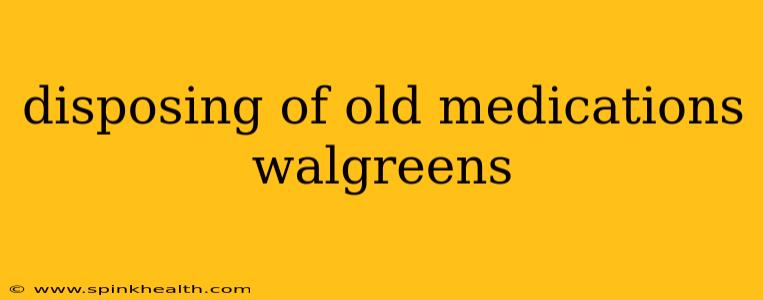The little bottle of antibiotics sits in your medicine cabinet, a relic from a long-ago illness. Or perhaps you've moved on from that prescription, leaving behind a half-empty container. What do you do with these leftover medications? Simply tossing them in the trash isn't safe for the environment or your family. This guide will walk you through the process of safely disposing of old medications, focusing on options available through Walgreens and other responsible disposal methods.
This isn't just about convenience; it's about protecting our communities and the planet. Improper disposal of medications can lead to accidental poisoning, water contamination, and environmental harm. Let's explore the best practices for responsible medication disposal.
How Does Walgreens Handle Medication Disposal?
Walgreens participates in several medication take-back initiatives, offering a convenient way to dispose of unwanted medications responsibly. However, the specifics can vary by location. Some stores might have a designated drop-off box inside the pharmacy, while others might participate in larger community events. The best way to find out what your local Walgreens offers is to call them directly or check their website for specific store information. They may also participate in national Take Back Day events, which are usually publicized widely.
It's important to note that Walgreens will typically only accept medications; other items, such as sharps (needles) or inhalers often have specific disposal instructions.
What Types of Medications Can I Dispose of at Walgreens or Similar Programs?
Generally, you can safely dispose of most prescription and over-the-counter medications at designated drop-off locations. This typically includes pills, capsules, and liquids. However, some exceptions may exist:
- Controlled substances: Some programs may have specific procedures for controlled substances like opioids. Always inquire with the pharmacy beforehand.
- Needles and sharps: These require specialized disposal containers and should never be placed in a regular medication drop-off.
- Liquid medications: While typically accepted, you may need to follow specific instructions, such as removing the medication from its original container and placing it into a sealable bag.
What Happens to the Medications After I Drop Them Off?
Once collected, the medications are typically transferred to a licensed reverse distributor or a specialized hazardous waste disposal facility. These facilities use secure and environmentally sound methods to destroy the medications, preventing them from entering the environment or being misused.
What if My Local Walgreens Doesn't Have a Drop-Off Program?
Don't worry if your Walgreens doesn't offer a medication take-back program. There are other options available to you:
- Check with other pharmacies: Many pharmacies, beyond Walgreens, participate in medication take-back initiatives. Contact your local pharmacies to inquire about their policies.
- Contact your local health department or police department: They can often provide information on local medication disposal programs or events.
- Utilize mail-back programs: Some pharmaceutical companies offer mail-back programs for specific medications. Check the medication packaging for details.
Can I Flush Medications Down the Toilet?
The FDA generally advises against flushing medications down the toilet unless the medication's label specifically instructs you to do so. Flushing medications can contaminate our water supply, harming aquatic life and potentially impacting human health.
How Can I Make My Medications Less Appealing to Children or Others?
Safe storage is crucial to prevent accidental ingestion. Keep medications in their original containers, out of reach of children and pets, preferably in a locked cabinet.
What About Sharps Disposal?
Needles and other sharps require separate and safe disposal. Never place sharps in your regular trash or recycling. Contact your local health department or pharmacy for information on proper sharps disposal programs in your area. Many pharmacies offer sharps disposal containers, and some communities have designated drop-off locations.
By following these guidelines, you can ensure responsible disposal of your old medications, protecting both your family and the environment. Remember that proper disposal is a vital part of responsible medication management.

